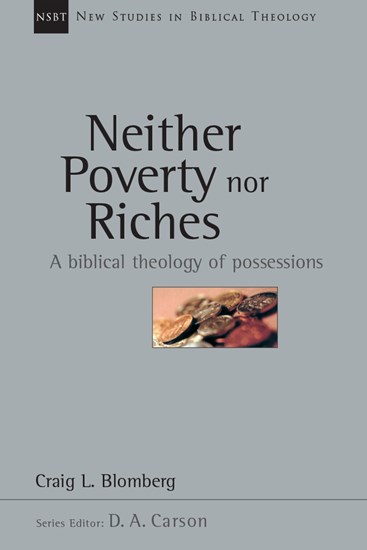
|
Neither Poverty nor Riches
ebook
|
- Length: 300 pages
- Published: February 05, 2015
- Imprint: IVP Academic
- Item Code: 9933
- ISBN: 9780830899333
-
Other Retailers:
Amazon*
*affiliate partner
-
paperback
Give me neither poverty nor riches, but give me only my daily bread. (Proverbs 30:8)
One of the most difficult questions facing Christians today is that of the proper attitude toward possessions. In wealthy nations such as Britain and the USA, individuals accumulate much and yet are daily exposed to the plight of the poor, whether the homeless on their own city streets or starving children on their TV screens. What action should we take on behalf of the poor? What should we do with our own possessions?
In Neither Poverty nor Riches Craig Blomberg asks what the Bible has to say about these issues. Avoiding easy answers, he instead seeks a comprehensive biblical theology of possessions. And so he begins with the groundwork laid by the Old Testament and the ideas developed in the intertestamental period, then draws out what the whole New Testament has to say on the subject, and finally offers conclusions and applications relevant to our contemporary world.
Neither Poverty Nor Riches is one book that all should read who are concerned with issues of poverty and wealth.
CONTENTS
Series Preface
Author's Preface
Abbreviations
Introductory Considerations
A Sampling of Statistics
Christian Response
1. The Old Testament and Material Possessions: The Historical Books
From Eden to Sinai
From Sinai to Canaan: the Law of Moses
In the Promised Land: Cycles of Obedience and Disobedience
Summary and Conclusions
2. The Old Testament Wisdom and Prophetic Literature
Poetry and Wisdom Literature
The Prophets
Summary and Conclusions
Conclusions Concerning the Entire Old Testament and Material Possessions
3. Additional Historical Background: Between the Testaments
Socio-political Developments
The Literature of the Jews
Other Ideological Developments Prior to the New Testament
Information from the Gospels Bearing on the Socio-economic Status of the Main Characters
Conclusions
4. The Teaching of Jesus in the Synoptic Gospels
The Parables of Jesus
The Remaining Teachings of Jesus
Conclusions
5. Earliest Christianity
The Epistle of James
The Book of Acts
6. The Life and Teaching of Paul
Galatians
1 and 2 Thessalonians
1 Corinthians
2 Corinthians
Romans
The Prison Epistles
The Pastoral Epistles
Summary and Conclusions
7. The Rest of the New Testament
The Synoptic Evangelists
The Rest of the New Testament
Summary and Conclusions
8. Summary, Conclusions and Applications
Summary
Additional Conclusions
Applications
Bibliography
Index of Authors














